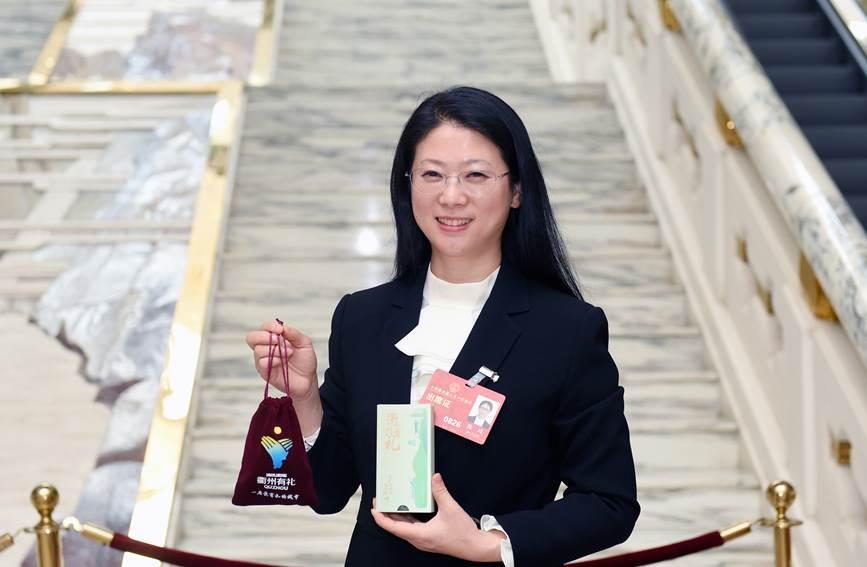[Chen Wei, deputy to the National People’s Congress: Accelerate the research and development of artificial intelligence and improve the health service capacity of Chinese medicine]

Chen Wei, deputy to the National People’s Congress and vice president of Quzhou Traditional Chinese Medicine Hospital, Zhejiang Province. Photo courtesy of respondents
In recent years, with the change of disease spectrum, the acceleration of aging, the improvement of residents’ living standards and many other factors, the demand for health services of residents has become increasingly diversified, and higher requirements have been put forward for rehabilitation, health care and other services.
"In terms of health care, Chinese medicine has advantages. The introduction of artificial intelligence technology into the field of Chinese medicine has created a new environment for its development. " During the two sessions of the National People’s Congress in 2023, Chen Wei, deputy director of the National People’s Congress and Quzhou Hospital of Traditional Chinese Medicine in Zhejiang Province, paid special attention to "accelerating the research and development of artificial intelligence and improving the health service capacity of Chinese medicine".
In her usual work, Chen Wei found that the intervention of artificial intelligence made it possible to use the "holistic concept" of traditional Chinese medicine to guide health management. "For example, in the health management at the stage of empowerment, personalized health management can be achieved by detecting and collecting relatively high-quality physical sign signals and intelligently predicting human health status through portable wearable intelligent equipment; In the health management at the stage of empowerment, the use of intelligent training means, combined with traditional Chinese medicine experience and strong artificial intelligence interaction means, can help long-term sub-health or groups with chronic diseases and physical disabilities to achieve rehabilitation training, and intelligently analyze physical function data to optimize and adjust treatment plans in real time. " Chen Wei introduced.
In the practical application of artificial intelligence equipment, many problems have also been exposed. "The main problems are unreasonable algorithm design and model construction, lack of available data of traditional Chinese medicine, lack of standards, and shortage of artificial intelligence talents of traditional Chinese medicine." For example, Chen Wei said that in the face of diseases with single condition and clear diagnosis, artificial intelligence equipment can still give a better diagnosis scheme, but in the face of more complicated cases, it will highlight the lack of flexibility and flexibility in diagnosis.
In addition, although the diagnosis and treatment of artificial intelligence brings great convenience to medical activities, it cannot give patients humanistic care. In the process of diagnosis and treatment, patients not only have to endure the physical pain caused by illness, but also bear great psychological pressure. At the same time, patients are often unable to accurately describe their illness due to great psychological pressure, lack of professional knowledge or limitations of diseases. Due to these vague or distorted information, the applicability of artificial intelligence instruments will be severely challenged.
To this end, Chen Wei suggested improving the top-level planning and pointing out the development direction. "Top-level planning is the premise of the development of artificial intelligence. In order to promote the development of artificial intelligence in the field of traditional Chinese medicine, relevant departments should scientifically analyze the development prospects and actual research and development of artificial intelligence in traditional Chinese medicine, and formulate top-level planning and phased research directions with disciplinary characteristics." Chen Wei believes that in view of the characteristics of "thousands of people and thousands of prescriptions" in traditional Chinese medicine, the planning should focus on improving the innovation of technology and the flexibility of equipment in the process of medical activities, making full use of the database of traditional Chinese medicine, and giving play to the functions of auxiliary diagnosis and treatment and health management of artificial intelligence of traditional Chinese medicine.
At the same time, the development of TCM artificial intelligence involves knowledge of TCM, computer, mathematics and other disciplines. The development of TCM artificial intelligence should take TCM as the core, take computer, mathematics, machinery, electronics, engineering and other disciplines as tools, improve the equipment software system, and standardize and digitize the data. In this regard, Chen Wei suggested that colleges and universities should establish and improve the training mode of compound talents of traditional Chinese medicine and artificial intelligence, optimize the high-tech innovation system, strengthen inter-disciplinary exchanges and multi-disciplinary cooperation and development, and provide conditions for training interdisciplinary comprehensive talents.
User experience is also a key point that cannot be ignored. Chen Wei believes that it is necessary to strengthen the technical training of medical personnel in TCM artificial intelligence equipment and application, so that small doctors can prescribe relatively accurate prescriptions and improve their diagnosis and treatment ability. At the same time, pay attention to the implementation of equipment use, encourage residents to actively experience the equipment and carry out the market demand survey of artificial intelligence in traditional Chinese medicine, so that the equipment can be fully utilized, truly serve the society, and promote the inheritance and development of health services in traditional Chinese medicine.